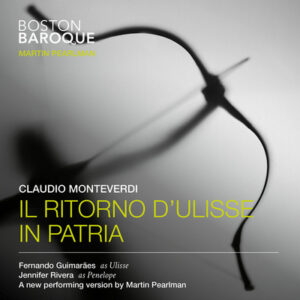Probably the least popular of Monteverdi’s three extant operas, Ulisse is in fact a remarkable work, one that, although filled with gods and other characters from classical antiquity, is nonetheless the most human of the three. The relationships between the characters–Ulisse and his son, Telemaco; the old nurse Ericlea and Penelope; the swineherd Eumete and Ulisse–and their predicaments are all well drawn. Even the goddess Minerva works hard for Ulisse and helps him along lovingly–and of course the steadfast Penelope, although she is almost more icon than human being, is sympathetic. The three suitors and their snide commentary, the machinations of the glutton Iro, and the interactions of Guinone, Giove, and Nettuno are all perfectly timed, and the lovers Melanto and Eurimaco are not cartoons.
Monteverdi’s surviving manuscript is lacking with regard to instrumentation, so wise conductors tend to have free rein in deciding what the opera “sounds” like. Boston Baroque’s Martin Pearlman has prepared a relatively bare-bones edition (especially if compared with Harnoncourt’s remarkable extravaganza-edition and René Jacobs’ brilliant re-creation) with just a few strings and, for special moments, cornets and recorders. I have no issue with the sparse sound–it brings the characters forward–but the performance as a whole is emotionally spare as well, and that just won’t do.
If one were to compare the dialogue (as opposed to the ariosos and arias)–which makes up 80 percent of this opera–with Jacobs or Harnoncourt (or Vartolo or even Curtis), one would be startled: this performance, although it was recorded after semi-staged performances, is utterly bland. The continuo plunks away underneath and there is no sense of real give-and-take between the characters. The celebratory moments between father and son go by with little feeling, and even the final scene, in which the Nurse proves to Penelope that the man in front of her is truly Ulisse, and the ensuing cathartic duet, which normally brings tears to the eyes of the listener (try Bernarda Fink and Christoph Prégardien, or, on an old Arthaus video, the amazing Janet Baker and Benjamin Luxon), seem matter-of-fact. Perhaps it’s because Pearlman has the singers stick to strict tempos (Jacobs allows a great deal of rubato) that the overall effect fails.
The singing is stunning, and the singers use vibrato. (I mention this only as a warning to “purists”.) I think one of the suitors should have been cast with a countertenor and Giove should not sound like a teenager, but these are little quibbles. This opera doesn’t ask for singers with wide ranges; almost every voice remains within 10 middle-of-the-voice notes, particularly the two leads. This, of course, means that as much expression as possible is needed, since high notes aren’t available for excitement.
Mezzo Jennifer Rivera is a lovely, modest Penelope and her voice is beautiful, much in the Janet Baker mold. It’s a pity that when she’s rejecting the suitors with vehemence, the strings underpinning her determination are wishy-washy. Fernando Guimarães sings Ulisse with feeling, intelligence, and an appealing light baritone–based on their vocal colorations, this Ulisse and Penelope make a fine couple. The Telemaco of Aaron Sheehan is another standout, sounding young and urgent, and Leah Wool’s Minerva, with the opera’s highest tessitura and most florid vocal line, is a joy to hear. Marc Molomet’s Iro is not as crazed and vulgar as I like, but on its own and Pearlman’s terms, it’s a fine portrayal. Why the brief choral episodes from heaven and the sea are recorded as far away as they are is beyond me (so to speak). The others are quite good. I have no complaints about the recording save for the distant chorus.
And so–handsome singing and playing, but at a very low temperature; scenes go by without making much effect. The Jacobs, odd though it may be with cuts in Monteverdi’s score and additions from other composers, is still a genuinely moving, stageworthy, dramatic event, and the first choice.
































